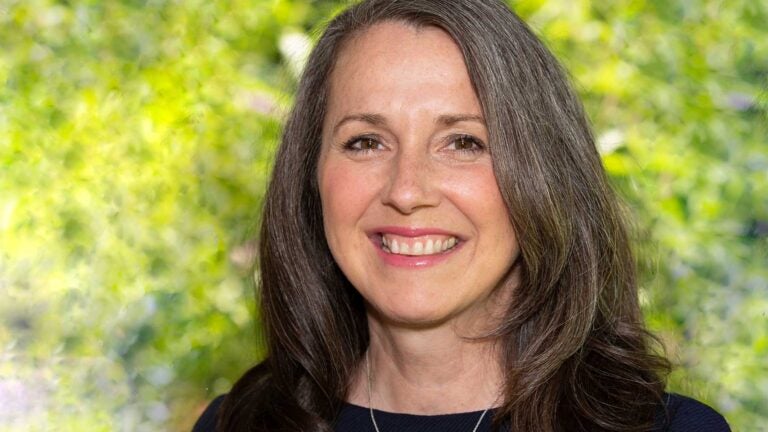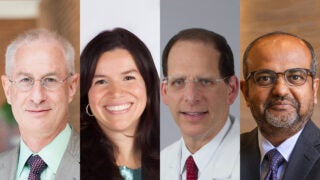
Catherine Spear strives to be accessible and authentic in her work on discrimination, equity and civil rights in higher education. (Photo/Michael Spear)
USC’s new equity and Title IX expert guided by desire to help people through tough times
Attorney and higher ed leader Catherine Spear sees respect, access and inclusion at the heart of her work to prevent and address misconduct and discrimination.
Catherine Spear tackles some of the most complex issues on college campuses: discrimination, harassment and sexual misconduct. Now she is taking them on at USC.
As USC’s vice president for equity, equal opportunity and Title IX, Spear will oversee a new office dedicated to preventing and responding to all forms of discrimination, complying with civil rights laws and ensuring equal access and opportunity among all members of the university community. The Office for Equity, Equal Opportunity and Title IX combines the former Office of Equity and Diversity with the Title IX Office, elevating the role of the Title IX coordinator. Spear reports to Felicia Washington, senior vice president of human resources.
When she talks about her role, though, Spear describes a broad mission that goes beyond detailed policies and procedures. It’s about a higher cause.
“I’ve always said we don’t do compliance for compliance’s sake,” she said. “You have to think about the fundamental value that we should all hold as human beings around equity. You want people to be able to access the same benefits, privileges and opportunities and not have any barriers put in their way because of their race, their sexual orientation, their disability or any other protected status.”
The civil rights attorney joins USC with decades of experience in higher education and government service. Spear recently spoke with USC News about her years in a field that can be as rewarding as it is challenging.
What drew you to this position at USC?
I had been paying attention to what was happening at USC because my daughter had been attending a master’s program focused on urban planning at the USC Price School of Public Policy for the past two years. When I saw the posting for this position, I think that’s what really resonated with me — you can see the intent and commitment to recognizing not just Title IX by itself, but also the value of bringing together all the protected categories under one umbrella. It’s a very similar role that attracted me to UVA [the University of Virginia].
I was excited about the opportunity to go where there seems to be a real need in that space, along with the leadership to support it. That’s another aspect: the energy that comes with new leadership.
What are your broad goals in this new role?
First and foremost, it’s about learning. I want to do that based on data that is already available — climate surveys, recommendations, demands, public comments. I try to keep my finger on the pulse of what’s happening in a community. I’ve been doing that homework.
Then I want to reach out with active listening, but to do it in an informed way so that I’m not taxing individuals, particularly those from vulnerable or marginalized groups who have had to tell their story over and over again without feeling like they’ve seen much progress. That interpersonal connection and making myself available to talk to multiple stakeholders is really important to me.
It’s about creating structures and a presence that people feel they can trust.
Catherine Spear
After that, it’s about bringing together the people who will be working in this new office we are creating. We’ll be rolling up our sleeves to create a strategic plan with short-term and long-term actions. We have to be clear on messaging around civil rights, but also take visible action. And we need transparency and accountability metrics to publicly communicate information about our progress.
Ultimately, we want to get to the point where if you stop someone and ask what our office does, they know we exist, they know what we do and they understand our role and how we can add value to USC. In an institution like USC that has learned some hard lessons and has gone through some tough times, it’s about creating structures and a presence that people feel they can trust. When things happen, they know where to go for help and there’s a level of trust that the process will hold wrongdoers accountable.
How do you rebuild that confidence in the system?
Whenever there has been a break in trust, it’s always difficult to repair. But you have to be hopeful that it can be fixed. It takes a lot of work and a willingness to be vulnerable and uncomfortable. Trust is going to take some time, and it’s not enough to say we have a new team, we have a new person, we have a new office. You have to show by doing.
Trust is also about how you feel. Do you feel valued and heard and respected? Was it a sensitive process? Was it a fair process? Trusting the process and feeling it was fair are different than being happy with the outcome. You want to get to the point where someone might not be satisfied with the outcome but feels that the process they went through didn’t retraumatize them and wasn’t unfair.
But you can’t just say that it’s going to take time. You need to have active, continuous engagement and work. And you have to be available, accessible and authentic.
This is a new position that combines Title IX and Office of Equity and Diversity functions. How does this reorganization benefit the university?
Regardless of the type of discrimination or harassment — whether based on sex, gender, race, ethnicity, disability, age — there are commonalities. How you go about determining whether something has happened, looking at how you might be able to repair or remedy that or hold someone accountable, and the analyses you undergo in taking the evidence you gather and applying your policies are all similar. It’s important to have people who are doing that work under the same umbrella so they can support and learn from each other.
There’s a lot of research about this, but one example is Kimberlé Crenshaw and her work around intersectionality. In a civil rights case, say a case involving harassment based on gender, you might have a Black woman who was harassed not just because of her gender but also because of her race. There’s value to having a diverse group of people with the skills and expertise in those spaces as part of a broader team.
USC is striving to change its culture regarding accountability and oversight. What are some strategies you hope to bring to those efforts?
We want to have public information available when we can. We might not be able to provide information about a particular situation because it’s confidential and a personnel or student issue. But that doesn’t mean we can’t share any information. What could be helpful in building trust is to create a public online dashboard where we’re sharing what we can at an aggregate level.
Often what may happen is university staff will take a lot of actions, but they may not get to that second step of communicating that out. Communication is really vital. That void of not communicating is not productive.
What are some lessons you’ve learned from past experiences that will guide you in this critical role?
It’s important to not run from conflict or ignore it. A lot of good can come from being uncomfortable or in situations where you’re going to learn something from someone who is different than you and has a different perspective and lived experience.
You really have to take the time to collaborate and communicate with partners.
Spear
Another lesson I’ve learned is that collaboration is key. In terms of listening and learning, the way in which I work is not to come in and say, “OK, this is what we’re going to do because it’s worked for me elsewhere.” You really have to take the time to collaborate and communicate with partners. That continuous feedback keeps us actively engaged and makes us better.
One area where I did that at UVA was through recognizing the power of the arts to promote inclusion and equity. A lot of people see the work we do as being about compliance, so you’re educating about policy with required trainings, and people are falling asleep or checking out. But you can supplement or elevate those messages by partnering with the arts, whether that’s theater or film or painting or poetry. I like to find those unlikely partners.
What are your thoughts on the long-awaited changes to federal rules regarding Title IX and how colleges handle sexual misconduct investigations and hearings?
It’s going to be an auspicious start. On Friday, Aug. 14, the university’s new Policy on Prohibited Discrimination, Harassment, and Retaliation went into effect. I was able to review the new policy before the deadline and provide my input. That will be a big part of my portfolio. USC was in the same position as every other university and K-12 school throughout the country in needing to come up with revisions and upgrades to their policies and procedures to ensure compliance. Everyone at USC worked really hard on that, despite the fact that I think this was really unfortunate timing in light of the impact of the global pandemic.
I try to focus on the positive where possible. There are areas of discretion in the new requirements. One is with respect to supportive measures and types of informal resolution. For the first time, where appropriate, the U.S. Department of Education is acknowledging that restorative justice might be employed as a form of informal resolution.
Although the 2011 Dear Colleague letter has been rolled back now, what hasn’t been rolled back is the student activism, the advocacy, the focus nationally and globally on the issue of sexual- and gender-based violence of any form and how it is not acceptable.
What do you find rewarding about this work?
It’s about helping. People aren’t doing this work to be thanked. They’re doing this work because it’s their passion. They share my passion for equity and helping others. There’s nothing more important to me than higher education, and I want everybody to have access and not feel othered or diminished. The older I get, it becomes more important to do work that supports those goals.
From a very young age, my parents instilled in me the value of respect and care for my fellow human being. Over time, I’ve seen acts of unfairness, and it always spoke to me to be able, through my work, to see justice done.
I’ve grown so much in the last five years at UVA, and I look forward to bringing that to USC and continuing to grow. This work keeps you constantly thinking and innovating. That makes it really worthwhile. It’s incredibly satisfying to support people doing really difficult work and people going through really difficult times.
This interview has been edited for clarity and length.



